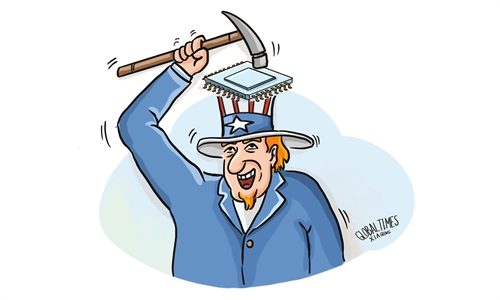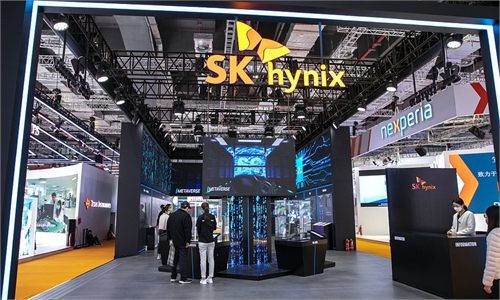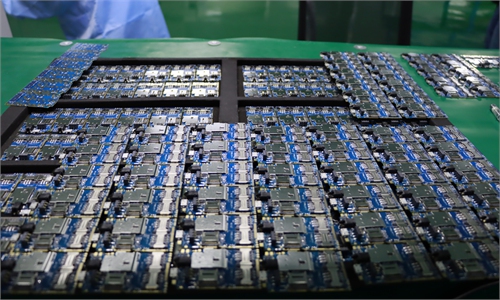
chip Photo:VCG
The US' delayed deal with allies on its China export ban shows there is increasing pushback from global chipmakers, who are frustrated with the geopolitical games being played by the Biden administration and warning of plunging sales and a disrupted global chip industrial chain, Chinese observers said.
The Biden administration expects to ink a "near-term" deal with allies to bring them on board with new US rules curbing China's access to sophisticated chipmaking tools, Reuters reported, citing a senior Commerce Department official as saying on Thursday.
"We expect to have a deal in the near term," Undersecretary of commerce for industry and security Alan Estevez said in an interview with a Washington-based think tank, when asked what it would take to get allies, particularly Japan and the Netherlands, to implement similar rules, said the report.
The report came weeks after Washington issued what was said to be the "harshest" export ban on chip technology in another attempt to thwart China's semiconductor development last week. But the US has so far been unable to persuade its so-called allies to get on board.
"A hanging consensus indicates increasing pushback from US chipmakers, and also shows the difficulties the US faces in kicking China out of its 'chip friends circle,' and in implementing the curbs on the ground," Ma Jihua, a veteran telecom observer, told the Global Times on Friday.
Pressuring industry giants to "decouple" from the Chinese mainland itself is also like walking a tightrope for the US. Due to the importance of the Chinese market, the US is worried that the efforts might backfire if it pushes "too much," Ma said, warning that if the US wants to "kill" China's chip industry, then the global industrial chain will suffer, or become "paralyzed."
Global chip firms are already fretting over the US chip ban, warning about falling sales, shrinking investment plans and concerns for future operations. For instance, SK Hynix said on Wednesday that it hopes there will be a one-year extension of its one-year waiver on chip equipment exports to China to maintain its fab operations in the country amid a sales slowdown.
SK Hynix's third-quarter sales fell 20.5 percent and operating profits fell by 60.5 percent quarter-on-quarter due to sluggish demand for DRAM and NAND products amid a worsening macro-economic environment worldwide.
The South Korean chip giant told the Global Times in a statement that it will continue its consultations with the US Department of Commerce and make the "utmost efforts" to operate its plants in China in a stable manner.
Meanwhile, ASM International said on Tuesday that it expects the new US export restrictions to weigh heavily on its sales in China, as it reported third-quarter revenues. According to ASM International, the restrictions will affect more than 40 percent of its sales in China.
Industry players have warned that if the new measures are strictly implemented, it could put as much as 30 percent of some US and global chip industry giants' total revenue at risk, as China accounts for one-third of their total revenue.
The US' eagerness to announce "progress" on its curb of China's chip industry also shows the anxiety of the Biden administration, as it's eager to win political points before the midterm elections, Ma said.
Commenting on the US' new export ban, Mao Ning, a spokesperson for China's Foreign Ministry, said on October 12 that the US' new export controls will hinder international tech exchanges and economic cooperation, and undermine the stability of global industrial and supply chains and global economic recovery.
The US' politicization and weaponization of technology, economic and trade issues will not stop China's development, but will only hurt the US itself, the spokesperson added.
It remains to be seen what impact it will have on Chinese enterprises, Xiang Ligang, an independent technology analyst, told the Global Times on Friday. "The US has been unable to curb China's chip development over the past four years, and it won't succeed now."



